 Welcome to the most fun website in the world!
Welcome to the most fun website in the world!
|
BlogBelow are the last blogs of this player. You can also post comments or subscribe.
|
| ⊰ Dragonflies ⊱ |
 Hi there! I've always admired dragonflies. And reminiscing to the summer that has just recently passed us by, I remember when a dragonfly at one of those sunny days landed on my finger and sat there for a good while before flying off into the blue skies ahead. I had watched it, studied it and admired its vibrant green colour that reflected beautifully in the sunlight, and as it went, I couldn't help but feel my interest in dragonflies reinforce and my need to find out more about them grow. Do you also share a fascination with these alluring creatures? Continue on and you might just learn something new about them! 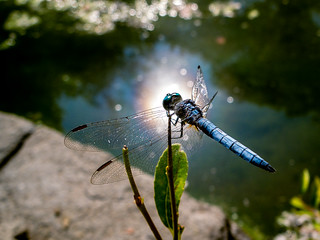 Dragonflies are insects who belong in the order Odonata (Greek for "toothed one", referring to their serrated, jagged teeth), which is an order of carnivorous insects. They are not to be confused with damselflies, who also belong in the Odonata order. Dragonflies and damselflies are close relatives and share a few similarities, but they can be easily distinguished by their slightly different characteristics. These differences includes that dragonflies are thicker in comparison and have their wings out to their sides when perched, while damselflies have narrow, slender bodies and have their wings closed above their bodies when perched. Dragonflies also have larger eyes that takes up most of the head while damselflies always have enough head-space to have a gap between their eyes. (Example; dragonfly to the left, damselfly to the right) 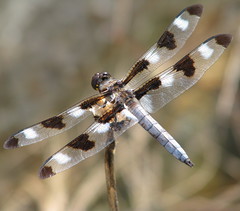 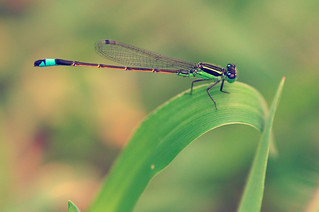 Dragonflies have marked their presence on Earth for a really long time. In fact, dragonflies were one of the first winged insects to evolve. Fossils over 300 million years old have been found of their ancestors, which means that they could be sported already during and before the Jurassic period - at the same time as our lovely dinosaurs ruled Earth! It is believed that the oldest ancestor is of the extinct order Meganisoptera that existed already during the Carboniferous and Permian period, before the Jurassic era. Now, these were a lot larger than todays dragonflies. One of them, the Meganeura monyi, has been discovered to have had a wingspan of up to 70 centimeters! A reason to why the Meganisopteras could become so large at the time could possibly have been because of the high amount of oxygen in the atmosphere, which is significantly lower today (for which we are grateful, we wouldn't want one of those flying into our faces in the morning! Hmm, I wonder what size we humans would have had..). The dragonflies we know today started evolving firstly around 150-200 million years ago. 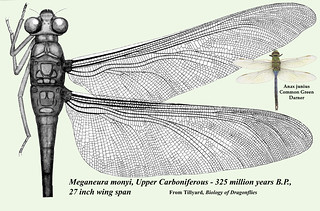 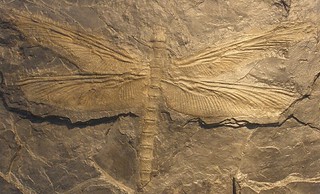 Meganeura fossil. In their early stages of life, dragonflies are nymphs and will actually live under water where they'll eat basically anything edible, and when they grow up to become adults they'll usually continue on residing near water. Dragonflies can be found in all continents except Antarctica. The reason for this is that they prefer a tropical climate, but some species are also satisfied in temperate regions. Dragonflies fancy warmth so much that some of them can be found in deserts, like the Mojave Desert in the United States, in shade temperatures between 18 to 45 °C! That's insanely hot and in fact above the thermal death point in body temperature in some insects of the same species that can be found in cooler regions. Well, see if they care about that, sometimes basking in the heat is just too nice! When it does get too hot on the other hand then they have their techniques. This involves partaking the obelisk posture, where they do a "headstand" with their bodies perched with the abdomen raised towards the sun, allowing less solar radiation to be received by their bodies and resulting in them feeling less hot (since they are cold blooded). However, dragonflies might sometimes raise their abdomens for other reasons as well, such as guarding their territories. Another way for the dragonflies to handle the warmth is to float across a surface of water, slightly touching it, in order to regulate their body temperature. Some species also have the evolutionary favor of having dark patches on the wings, providing some extra shade for their bodies. 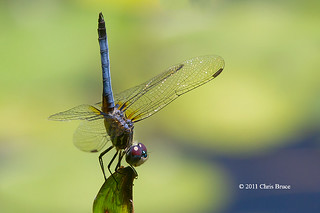 A dragonfly caught in the magnificent obelisk posture. These beauties also happen to be experts in flying. They can hover and direct themselves straight up and down and sideways however they want, and they can even mate mid-air! Isn't that.. interesting? They're also really efficient hunters with 90 to 95 percent success rate once they've set their eyes on a meal. Dragonflies don't have any particular tastes, but on their menu you can i.a. find flies, mosquitoes, aphids, leafhoppers, mayflies and butterflies, depending on their size and how easy the prey is to catch. Dragonflies are ruthless killers; seizing their prey with their feet and tearing off the prey's wings with their saw teeth, leaving no escape before devouring it. The dragonfly doesn't need to make a quick stop for the meal - it does everything while still in the air! Luckily, us humans usually aren't on their hit list. 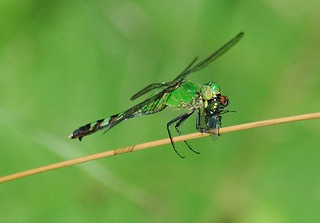 So, in quick recap; dragonflies are cool literal cold blooded carnivores with preferences for some hot and chill weather, and they are great pilots who do their fair share of controlling the insect population. Their ancient relatives might and might not have eaten them for breakfast if given the chance, but that doesn't matter now anyway since they're extinct. With their beautiful array of colours and their unusual and unique appearance, dragonflies have managed to capture interest all over the world (except Antarctica - too cold there) for centuries. They have been both an inspiration to many and have been notorious avians with some more or less dark reputations involving the devil and snakes and whatnot in some cultures. But one thing is for sure - these amazing creatures continue to fascinate yet today! ⊰ Thank you for reading! ⊱ 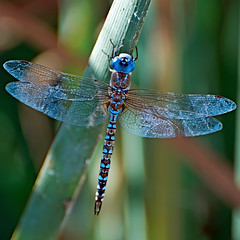 |